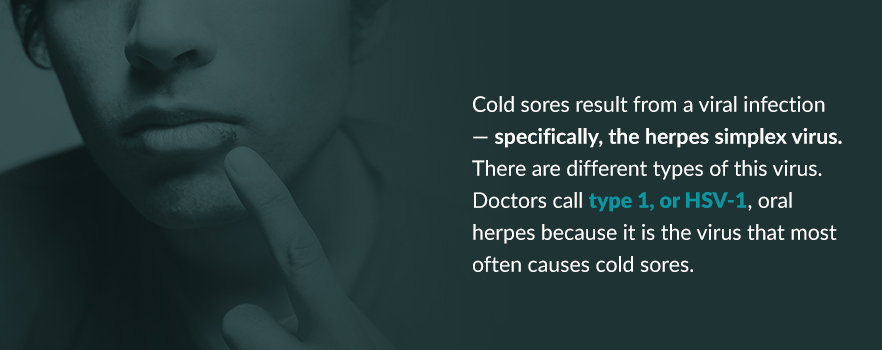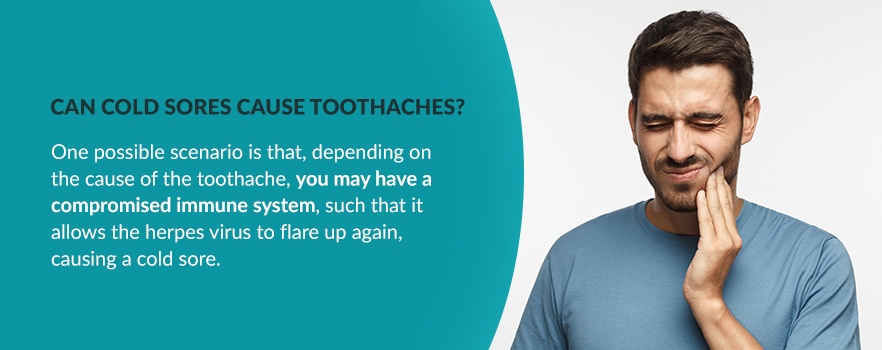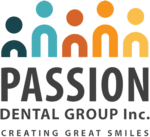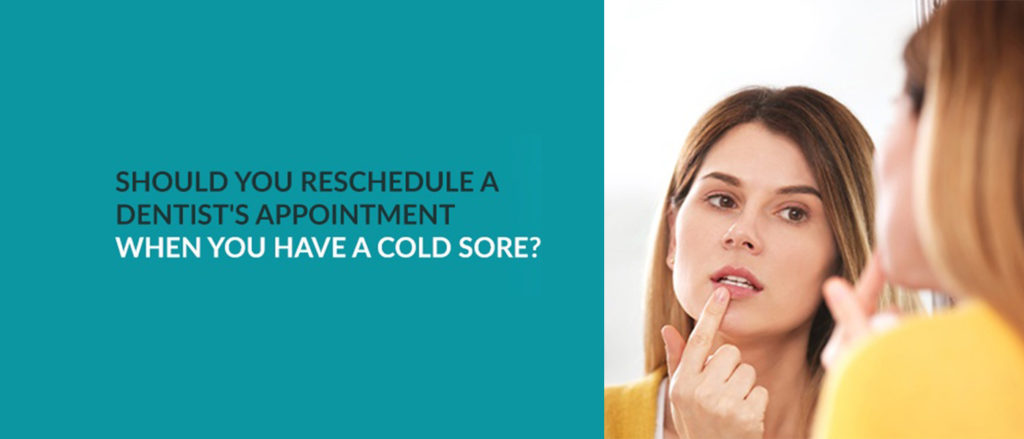
If you’ve dealt with cold sores, you’re not alone. The World Health Organization estimates that just over two-thirds of the global population has the virus that causes cold sores. In most cases, these sores are merely a nuisance and may make you feel a little self-conscious. When you’re planning to visit the dentist, however, cold sores are a more pressing concern. We’re going to answer some common questions related to cold sores and explain why you may want to reschedule elective dental care if you have a cold sore. Going to the dentist with a cold sore can have consequences for all parties involved.
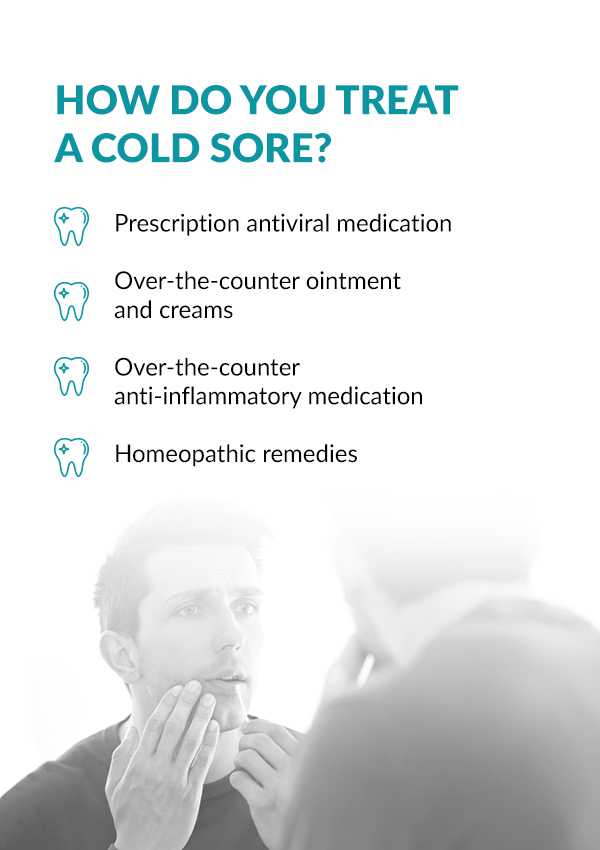 For most people, cold sores only appear occasionally, and with a quick trip to the pharmacy, you can get an over-the-counter topical treatment to aid in the healing process. However, if you’re getting cold sores frequently, you may want to seek out more intensive treatment. A doctor can prescribe an antiviral medication to help keep the onset of cold sores to a minimum. You would begin to take this medication at the first signs of an outbreak, rather than taking it all the time.
In addition to medical doctors, dentists may also prescribe medication to help treat cold sores. If you’re experiencing frequent cold sore outbreaks, you can mention this to your dentist and ask for some advice or a possible prescription. Your dentist may refer you to a medical doctor for treatment.
Some dental offices also have laser therapy equipment. Laser treatment can be effective at preventing a cold sore breakout if you get it when you first begin to feel the tingling sensation that suggests a cold sore is coming on. You can also receive laser therapy treatment on existing cold sores, which can speed up the healing process. Typically, dentists reserve this treatment for when they must perform emergency dental care on a person with a cold sore.
For most people, cold sores only appear occasionally, and with a quick trip to the pharmacy, you can get an over-the-counter topical treatment to aid in the healing process. However, if you’re getting cold sores frequently, you may want to seek out more intensive treatment. A doctor can prescribe an antiviral medication to help keep the onset of cold sores to a minimum. You would begin to take this medication at the first signs of an outbreak, rather than taking it all the time.
In addition to medical doctors, dentists may also prescribe medication to help treat cold sores. If you’re experiencing frequent cold sore outbreaks, you can mention this to your dentist and ask for some advice or a possible prescription. Your dentist may refer you to a medical doctor for treatment.
Some dental offices also have laser therapy equipment. Laser treatment can be effective at preventing a cold sore breakout if you get it when you first begin to feel the tingling sensation that suggests a cold sore is coming on. You can also receive laser therapy treatment on existing cold sores, which can speed up the healing process. Typically, dentists reserve this treatment for when they must perform emergency dental care on a person with a cold sore.
Table of Contents
What Are Cold Sores?
Let’s start with the basics. What are cold sores, and how do you know if you have one? Cold sores look like clusters of small blisters, which is why you may also hear people refer to them as fever blisters. One of the main things distinguishing cold sores from other types of lesions you may get on your body is where they appear. In the majority of cases, cold sores form on the lips or around the mouth. When you have a lesion form on or near your lip, you can bet that it is likely a cold sore. However, cold sores can also appear in other places, including on the nose and cheeks. Cold sores typically form and heal in predictable stages. First, you’ll feel a tingling or burning sensation near your mouth or wherever the cold sore is beginning to form. Around 12 to 24 hours later, the blisters will begin to appear. The area may look inflamed and can feel painful. The blisters will then start to break and leak fluid. Eventually, the blisters crust over, and the scab will fall off when they heal. It can take two to four weeks for cold sores to fully heal, though in many cases, they run their course in less time. You may be able to help the healing process along through various treatment methods, but cold sores should heal on their own without any intervention and shouldn’t leave a scar behind.Why Do Cold Sores Form?
Many people recognize a cold sore when they see one, but they may not know what causes these uncomfortable blisters to appear. Cold sores result from a viral infection — specifically, the herpes simplex virus. There are different types of this virus. Doctors call type 1, or HSV-1, oral herpes because it is the virus that most often causes cold sores. HSV-2 can also cause cold sores, but it typically affects the genital area instead. Most people who contract HSV-1 do so when they are children. The virus is widespread and passes quickly from one person to another via saliva. When someone first contracts HSV-1, they can experience a whole host of symptoms typically resembling those that accompany the flu. You won’t develop fever blisters during this initial infection, though. After the initial bout with HSV-1, the virus remains, but lies dormant in a person’s facial nerves. For various reasons, the virus can become active again from time to time. When this happens, cold sores appear on the face. Fortunately, a cold sore outbreak is the only noticeable symptom of a flare-up of HSV-1. You won’t experience the flu-like symptoms that can come with the initial infection. The virus will typically flare up when your body becomes compromised in some way. You may have a cold or you could be under-rested or stressed, for example. The best way to avoid cold sores, then, once you’ve contracted HSV-1 is to take good care of yourself and stay generally healthy. If you notice sun exposure brings on cold sores, regularly use sunblock on your lips.What Is the Difference Between Cold Sores and Canker Sores?
Canker sores are another type of sore that affects the mouth, but they are distinct from cold sores. The most distinct difference is that canker sores only appear on the inside of the mouth. So, if you have a sore on the outside of your mouth, it is not a canker sore and is likely a cold sore. You can get canker sores on your gums, on your tongue, on your soft palate or inside your lips and cheeks. Canker sores are typically isolated lesions, but herpetiform canker sores, a less common type that affects older adults, appears as a cluster of tiny sores. As with cold sores, you may feel some tingling or burning before the sores develop. Unlike cold sores, canker sores are not viral. Instead, they result from physical irritation, such as mouth injuries or abrasions from dental work. Going to the dentist with a canker sore can result in an uncomfortable appointment. It’s essential to note that, while flare-ups of HSV-1 bring on cold sores, the first time you contract the virus, you can get sores on the inside of your mouth. So, if you’ve never had a cold sore before and you experience flu-like symptoms along with sores inside the mouth, you could be experiencing an HSV-1 infection rather than canker sores.Can Cold Sores Cause Toothaches?
If you’re experiencing a toothache and you have a cold sore, you may wonder if the two problems are related. The short answer is that no, while cold sores can cause a painful sensation on the surface of your lips or skin, they cannot cause pain in your teeth or anywhere else inside the mouth. That said, the two problems can be indirectly related. One possible scenario is that, depending on the cause of the toothache, you may have a compromised immune system, such that it allows the herpes virus to flare up again, causing a cold sore. If your mouth pain is coming from your jaw rather than from an individual tooth, it could be a sign that you’re suffering from stress. Grinding teeth and clenching your jaw often go hand in hand with stress. As we’ve also seen, stress can give way to a cold sore flare-up. If you’re experiencing toothaches or any type of oral discomfort, contact us right away.Can Dentists Treat Cold Sores?
 For most people, cold sores only appear occasionally, and with a quick trip to the pharmacy, you can get an over-the-counter topical treatment to aid in the healing process. However, if you’re getting cold sores frequently, you may want to seek out more intensive treatment. A doctor can prescribe an antiviral medication to help keep the onset of cold sores to a minimum. You would begin to take this medication at the first signs of an outbreak, rather than taking it all the time.
In addition to medical doctors, dentists may also prescribe medication to help treat cold sores. If you’re experiencing frequent cold sore outbreaks, you can mention this to your dentist and ask for some advice or a possible prescription. Your dentist may refer you to a medical doctor for treatment.
Some dental offices also have laser therapy equipment. Laser treatment can be effective at preventing a cold sore breakout if you get it when you first begin to feel the tingling sensation that suggests a cold sore is coming on. You can also receive laser therapy treatment on existing cold sores, which can speed up the healing process. Typically, dentists reserve this treatment for when they must perform emergency dental care on a person with a cold sore.
For most people, cold sores only appear occasionally, and with a quick trip to the pharmacy, you can get an over-the-counter topical treatment to aid in the healing process. However, if you’re getting cold sores frequently, you may want to seek out more intensive treatment. A doctor can prescribe an antiviral medication to help keep the onset of cold sores to a minimum. You would begin to take this medication at the first signs of an outbreak, rather than taking it all the time.
In addition to medical doctors, dentists may also prescribe medication to help treat cold sores. If you’re experiencing frequent cold sore outbreaks, you can mention this to your dentist and ask for some advice or a possible prescription. Your dentist may refer you to a medical doctor for treatment.
Some dental offices also have laser therapy equipment. Laser treatment can be effective at preventing a cold sore breakout if you get it when you first begin to feel the tingling sensation that suggests a cold sore is coming on. You can also receive laser therapy treatment on existing cold sores, which can speed up the healing process. Typically, dentists reserve this treatment for when they must perform emergency dental care on a person with a cold sore.
How Do You Treat a Cold Sore?
You can’t remove the HSV-1 virus from your system, but you can treat your cold sores. There are several methods you can try to minimize your discomfort and help the cold sores heal more quickly. Let’s take a look at some treatment options you can consider.- Prescription antiviral medication: If you’re experiencing more frequent or severe cold sore outbreaks, a doctor may prescribe an antiviral medication for you to have on hand. Some common examples of antiviral drugs used to treat cold sores are acyclovir, valacyclovir, famciclovir and penciclovir. Some of these drugs come in the form of pills, while others are creams you apply directly to the affected area. In the case of severe cold sore infections, a doctor may inject antiviral drugs on site.
- Over-the-counter ointment and creams: If you visit your local pharmacy, you’ll find some over-the-counter treatment options for your cold sores. One of the most popular products is docosanol (brand name Abreva), which can speed up the healing process. You can also find some creams that contain lidocaine or benzocaine to help relieve pain.
- Over-the-counter anti-inflammatory medication: You can also take anti-inflammatory pills to help reduce the pain and discomfort your cold sores are causing. Most people have an anti-inflammatory medication, such as ibuprofen, in their medicine cabinet already, so this is an easy solution. You may experience some relief from the drugs, but they won’t aid in the healing process.
- Homeopathic remedies: Some people prefer trying alternative treatment options that don’t involve any traditional medications. One simple option that can provide some relief is a cold compress. Wet a washcloth and hold it on the area. You can also try natural creams that contain lysine, propolis or rhubarb and sage. To prevent future outbreaks, you may want to try overall wellness techniques to avoid stress or burnout.
Should You Reschedule a Dental Appointment If You Have a Cold Sore?
Dentists may be able to help you manage your cold sore treatment, but that does not mean you should go to the dentist while you have a cold sore outbreak. The most common scenario you’ll run into is that you have an appointment scheduled with your dentist for a cleaning, filling or some other dental procedure, and when the day arrives, you have a cold sore. Should you keep your dentist’s appointment with a cold sore? If this unfortunate scenario occurs, you should call to reschedule your appointment. Because cold sores are a common occurrence, it’s easy to shrug off the fact that you have one and continue with your plans. It’s crucial to remember, however, that cold sores are viral and therefore contagious. Someone who doesn’t have HSV-1 can contract the virus by coming into contact with your cold sore. That makes it unsafe for dental hygienists and dentists to work in your mouth when there is a cold sore there. Even before you see a cold sore, if you can feel one coming on, you may already be contagious. Once you have a visible cold sore, you can count on being able to transmit it to others. You’ll continue to be infectious until the scab falls off and the skin has fully healed. If you’re not sure whether you’re contagious, it’s better to err on the side of caution and reschedule your appointment for a later date. The exception to this rule is if you need emergency dental care. Some examples of dental emergencies that require a prompt visit to the dentist include a knocked-out tooth, a broken tooth or jaw, an intense toothache or a severe tongue or lip bite. These are all problems that require urgent attention, even if you have a cold sore. If you need emergency dental care while you have active cold sores, your dentist and hygienists will take careful measures to avoid coming into direct contact with your cold sores. They may use laser treatment to help prevent the spread of the infection. Some situations may feel urgent, but they can still wait a few days until your cold sores clear up. For instance, tooth sensitivity or pain you can manage with over-the-counter painkillers is still an indicator of a problem, but it doesn’t necessarily mean you need to rush to the dentist immediately. If you’re not sure whether your problem qualifies as an emergency, call the office and describe the symptoms you’re experiencing. Be sure to mention that you have a cold sore, so our staff can factor that into deciding the best time for you to come in.How Can I Avoid Spreading HSV-1?
Dentists and hygienists aren’t the only ones you need to be concerned about when you’re contagious. You should do all you can to keep from spreading the HSV-1 virus to other people, especially babies and small children. To avoid transmitting the virus, you should steer clear of:- Close or intimate contact with others
- Touching the cold sore
- Sharing a drink, utensil or anything that has come into contact with your mouth



